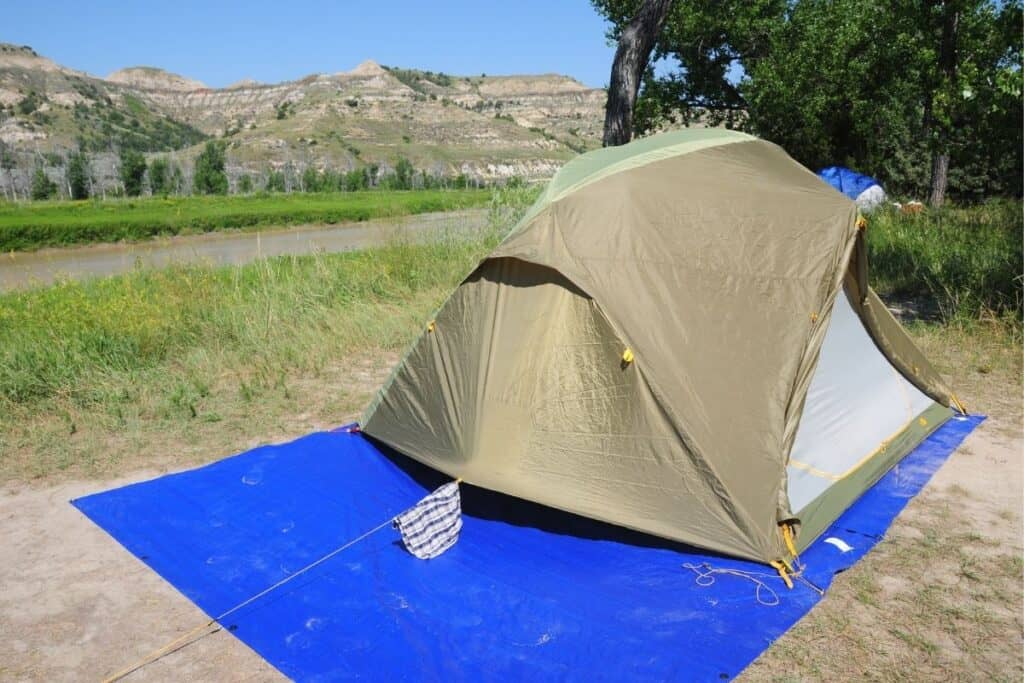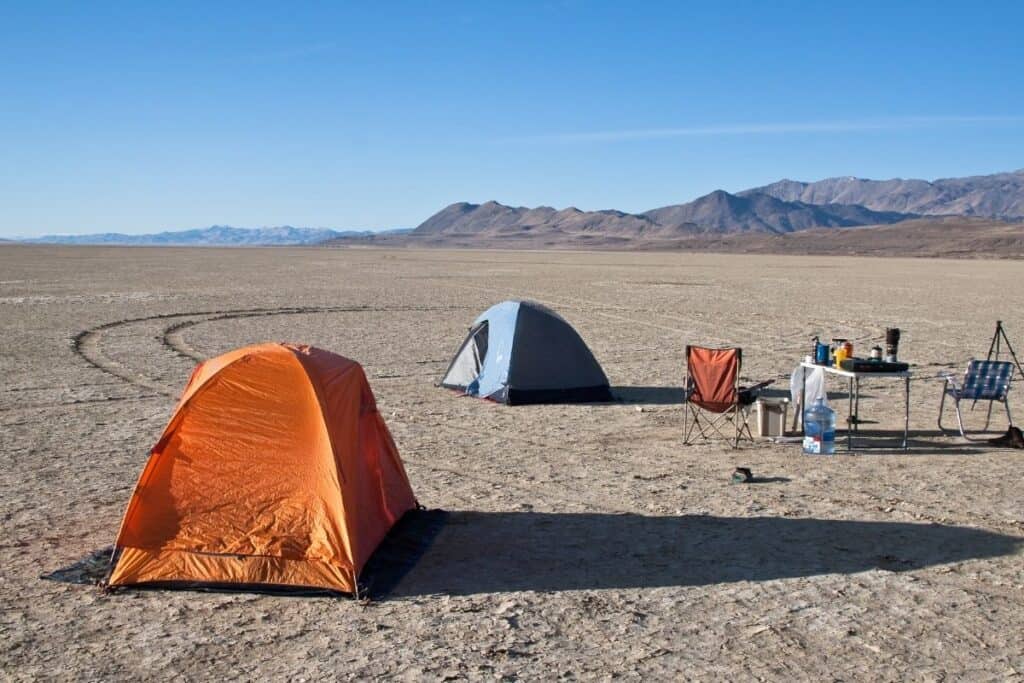
As much as we hikers, backpackers, and other outdoors enthusiasts love our camping gear, sometimes we slip up and forget to maintain critical care routines. One of those commonly overlooked responsibilities is keeping your tent clean.
But wait a minute – can you wash a tent? Though the task doesn’t cross most people’s minds, yes, you can and should wash your tent!
Tents can be washed but it is recommended to wash them by hand instead of using any form of automated washing to preserve its materials and extend the tents usable life. Allow the tent to fully dry after washing before storing.
See the guide below to keep this critical part of your backcountry setup in top shape.
What Is the Best Way to Clean a Tent?
Cleaning your tent is crucial to extending its life and preserving its resilience. This gear is critical to your safety and health during your stints in the wilderness.
So, you must handle it with the utmost care and attention through each step of the washing and maintenance routine.
With all this in mind, you can’t merely toss your tent into the washing machine and be done with it (more on this in the next section). Instead, it’s best to tend to your gear by hand according to the instructions below.
First, here’s what you’ll need to get started:
- Washbasin, bathtub, or another large container to hold water
- Soft sponge or cloth
- Mild, unscented dishwashing liquid
- Specialized cleaner for outdoor gear (this will help eliminate any lingering odors)
- Rubbing alcohol
Once you’ve gathered all the necessary items, it’s time to get started:
- Spot clean to remove stains. Before you jump into the full cleaning, you need to tackle those pesky stains first. You’ve likely pitched your tent under trees before, meaning you may have some stubborn pine sap to get out of the material. Dirt stains and other blemishes have probably built up over the years, too. Spot cleaning will do the trick for it all!
- Smudge-specific tips: You can remove pine sap by soaking the spot in rubbing alcohol before gently scrubbing with detergent and warm water. Mineral oil and other alcohol-based products like hand sanitizer and wet wipes work well, too. On the other hand, mildew requires a full tent-soaking and an enzyme cleaner.
- Fill your basin with cold to lukewarm water.
- Add your specialized outdoor gear cleaning solution.
- Unzip the tent’s doors and windows and flip it inside out.
- Shake out the tent and the rainfly.
- Brush zippers and other hardware with a soft toothbrush to remove any built-up grime and debris.
- Wipe down all the poles with a soft, dry cloth.
- Submerge the tent in the basin and let it soak.
- You can either handwash the rainfly while you let the tent soak or submerge it in the basin.
- Rinse everything by emptying the basin and refilling it with clean water of the same temperature. You might need to repeat this step a few times, depending on how long it’s been since the last wash or where you’ve been camping. Once the water is all clear, you can move on to drying your gear.
- Air-dry the tent by pitching it up and leaving it in a safe location outside.
- Note: It’s best to keep the tent out of the sun while it dries. Otherwise, you risk discoloration and degraded waterproofing. Rotate it every few hours to give each side time in the breeze, giving you an even finish. I recommend drying the rainfly separately. Draping it on top could block the rest of the tent from drying.
That’s all there is to it!
Cleaning your tent can take a while since it’s all a waiting game, mainly in the soaking and drying.
Yet, it’s a relatively simple task that, nevertheless, demands your careful attention to prevent any mishaps with the tent’s material or excessive accumulation of dirt, sweat, sap, and everything in-between.
How Do You Know When It’s Time to Wash a Tent?
Your tent is a staple of life in the great outdoors. This means that you’re probably not going to be as sensitive to any odors it gives off most of the time, as your nose will be filled with the beautifully musty scents of the wilderness.
Plus, camping gear almost always takes on the smells of the areas you camp in, right? This is part of its nostalgic appeal: Every time you unroll your sleeping bag or pitch your tent, the fragrances of past campfires and familiar pine trees come wafting into your nose.
Still, there will be times when your tent smells a little… off, so to speak. If you notice any of the following issues (odorous and visual), then it’s most likely time to give your tent a bath:
#1 Mildew or Moldy Smell
You can recognize mildew by its tangy, almost sour odor. It’s a smell that most people would associate with dampness, sort of like a nasty, sweaty sock.
If you pick up on these odors while sleeping in your tent or packing it for the next trip, you should clean your tent as soon as possible.
Note: If you can help it, please avoid sleeping in a mildewy tent. Exposure to fungal spores can lead to respiratory and skin irritation. Those with mold allergies can experience severe allergic reactions.
For more information about this, make sure to look at my dedicated article on dealing with mold or mildew in tents.
#2 Stiffness or Other Abnormalities in the Material
Dirty tents will not perform as well as they used to. It might be hard to pitch, the zippers may get jammed or broken, and other small issues will build up until it eventually becomes irreparably damaged.
Once your tent seems unusually difficult to work with, set aside some time for a thorough cleaning.

How Long Should You Air out a Tent?
The time required for your tent to fully air dry depends on how you cleaned it.
More specifically, if you need to add a new layer of a waterproofing sealant, this will extend your dry time. If this is the case for you, you’ll need a full 24 hours for the tent to dry and the sealant to set in.
However, suppose you did a simple wash without reinforcing the waterproof materials and seams. In that case, the drying process could take anywhere from 30 minutes to several hours.
I know, I know, that’s not exactly what you wanted to hear, but let’s break it down:
Air drying your tent in the breeze and sun (lots of people do this, even though it’s not recommended) will keep the dry time down to that brief 30-minute estimate.
Although, if you’re following the above instructions to the “T”, then it’ll take a bit longer. Potentially creeping up to the multiple-hour estimate if there’s no breeze or temperatures are too low.
Either way, please avoid air drying your tent in below-freezing conditions. You could quite literally freeze it; then you’re really in trouble!
What Happens If You Put a Tent Away Wet?
Understandably, you might want to get the cleaning process done and over with as soon as possible. You’ve probably put in a few hours by the time the tent is ready to dry.
Still, you can’t give in to the temptation to fold up your tent and tuck it away before it’s thoroughly dried. The drawbacks of throwing in the towel like this far outweigh the convenience.
The biggest concern about storing a wet tent is that you’ll invite mold and bacteria to grow in the material. Dark, moist, enclosed spaces are these microorganisms’ favorite spots to proliferate, so wrapping up a wet tent is just a recipe for disaster.
For the same reason, you want to avoid storing your tent in the following places:
- Garage
- Attic
- Trunk of a vehicle
These places aren’t only bad because of how humid and dark they can get, but because their ambient temperatures are never stable, either.
They can range from freezing cold to sweltering hot. Extreme environmental fluctuations like this can inflict severe damage on your tent, wet or not.
Can You Wash a Tent in a Washing Machine?
Never – ever wash your tent in a washing machine!
Even renowned manufacturers like Big Agnes warn outdoors people to avoid automated washes at all costs.
Why?
The washing machine is far too harsh on the tent’s material, even apart from the chemicals present in any cleaning solutions you might add. The vicious cycling and heat can rip the material to shreds or weaken it so much that you can’t use it anymore.
Plus, the cleaners you’d normally use – harsh detergents, bleaching, etc. – will inflict severe damage on the tent’s waterproofing, leaving it entirely useless for sleeping in inclement weather.
However, there is an exception (as always). If you have no other choice for washing your tent, you can carefully wash it in an oversized front loading washer.
These don’t have agitators (the middle, ridged cylinder in the center that moves the clothes around) like top-loaded washers, reducing the chances of severe damage.
Plus, frontloading washing machines have more options for fabric types, so you’ll have an easier time adjusting the settings to protect your tent’s material.
Summary
So, can you wash a tent? Absolutely! It’s an easy but vital part of maintaining your outdoor gear. It can be tough to tell when it’s time to wash it, so watch for any abnormal smells or operational challenges to clue you into when it needs a bath.
When you’re ready, follow the instructions and tips discussed here to ensure your tent is squeaky clean and ready for the next adventure.
Related Articles
If you found this article helpful, then make sure to take a look at some of these related posts as well!
